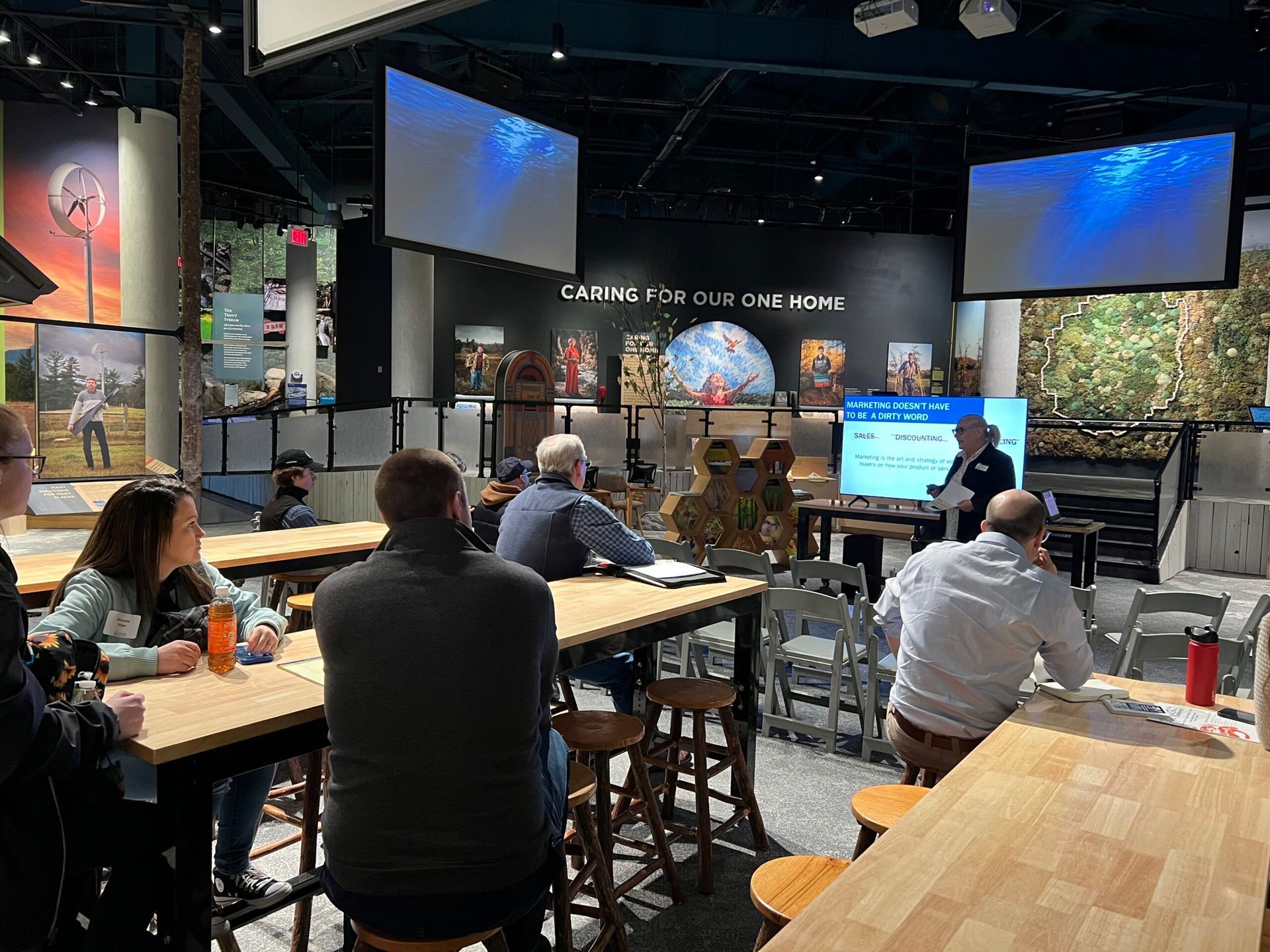Adirondack Common Ground Alliance 2022 Blueprint for the Blue Line
For Governor’s staff, Commissioners, Senior Agency Staff, Legislative leaders and their staff
The Adirondack Common Ground Alliance (CGA) is a diverse network of stakeholder focused on addressing issues that affect the Adirondack Park. Created in 2007, CGA gives voice to a shared agenda through development of an annual Blueprint for the Blue Line, a summary of recommendations for state action that benefit the Adirondacks. CGA supports the twin goals of environmental quality and economic vitality, with the aim of making the Park and its communities sustainable for generations to come.
In the summer of 2021, more than 100 citizens participated in the 14th CGA Forum, whose theme was CREATING VIBRANT AND WELCOMING COMMUNITIES. As a direct result of the forum, we put forth selected recommendations within four priority themes: housing, creating a vibrant economy, community-based recreation, and climate change mitigation and adaptation. Also included are a set of recommendations for state action around a set of continuing unfinished priorities. Thank you for the opportunity to present these recommendations and for your consideration of these requests.
HOUSING IN ADIRONDACK COMMUNITIES
A range of housing options is severely lacking yet is urgently needed to ensure the health of our communities.
Offer grants to support community housing market analyses on at least a county-by-county basis, in order to provide current, actionable data on the types of housing available and the types of housing needed.
– Incorporate the results of these market analyses into regional economic development plans.
– Authorize a pilot land bank(s) within the Park – to better align available land with available infrastructure and facilitate small-footprint, high-density
CREATING A VIBRANT ECONOMY
There is a need to foster career opportunities, develop high quality jobs and attract/support entrepreneurs to start or take over new businesses.
– Expand trades education via BOCES and community colleges and prioritize promoting the trades, starting at early education through adult learning, as a suite of viable and lucrative job and career options.
– Advance tax credits and other policy incentives to level the playing field for small businesses to offer health insurance, paid time off, paid family leave.
– Require that CFA funding through Empire State Development prioritize and explicitly call for grant applications for businesses transitioning to new ownership and worker-owned cooperatives.
COMMUNITY-BASED RECREATION
Diverse recreational activities on Forest Preserve and easement lands should complement community-based recreational assets to enhance community vitality, attract new residents and increase visitation.
– Finalize and implement the Visitor Use Management and Wildlands Monitoring guidance document, and undertake planning on a “land complex” scale rather than discrete units and that integrates recreation opportunities on public and private lands.
– Hire additional forest rangers and other state positions related to planning, management and stewardship of public lands consistent with increase in size of the Forest Preserve and heightened use of public trails.
– Increase funding for natural resource stewardship and education, trail maintenance, and environmentally sustainable recreational infrastructure.
– Invest in varied recreational opportunities on private lands when it serves a public purpose, such as developing recreation management plans on conservation easement lands, and funding capital projects to implement these plans.
CLIMATE CHANGE MITIGATION & ADAPTATION
Build upon New York’s Climate Leadership and Community Protection Act to be better prepared for and resilient to climate change impacts such that we are maintaining ecological function, bolstering carbon sequestration potential, and fostering biodiversity in our natural systems.
– Develop a framework for administration of and equitable access to environmental bond act funds. Allow for multiple eligible applicants, including municipalities, NGOs, academic institutions. Increase the bond act from $3B to $4B and ensure a fair share of funds touch down in Adirondack communities and wilderness.
– Disaster planning, self-sustaining stream restoration, and renewable energy infrastructure siting should be done with the best available science and both a local and regional level. Develop a new program to move people and infrastructure out of harm’s way, and protect floodplains and wetlands from future inappropriate land use.
– Bolster the capacity of state agencies to help communities prepare for and adapt to the impacts of climate change. Increase funding available for key programs such as Climate Smart Communities, Clean Energy Communities, the Local Waterfront Revitalization Program, countywide resilience planning.
– Support policies that recognize that a sustainable forest management strategy, particularly on private forest lands, aimed at maintaining or increasing forest carbon stocks while producing an annual sustained yield of timber, fiber, and energy from the forest, will generate the largest sustained climate mitigation benefit.
CONTINUING THE CALL TO ACTION: PREVIOUS BLUEPRINT PRIORITIES
CGA lauds state efforts to realize the recommendations in previous Blueprints for the Blue Line. There are several key recommendations that warrant continued advocacy and additional actions to address:
– Expeditiously implement the recommendations outlined in the recently released Upstate Cellular Coverage Task Force Report
– Fund a demonstration project, which will serve as a vehicle to pursue Federal Infrastructure or Federal Communications Commission funding for cellular deployment
– Dedicate federal unrestricted funds to assess the availability, affordability and reliability of high-speed broadband services in New York State, recognizing that reliable broadband is needed to enable equitable access to telehealth, as well as remote learning and working opportunities
– Revisit the Department of Transportation Right-of-Way Occupancy Fee to make it equitable for rural communities, consider exemptions for areas with low population density
– Sign A2396A, which relates to broadband attachments to utility poles and pole replacement costs
– Sign the Aquatic Invasive Species Transport Law to protect Adirondack lakes and rivers from the risk of new species introductions from recreational boating
– Finalize appointments to the Road Salt Reduction Task Force and begin work immediately
– Assist local governments to apply for and administer state grants through programs such as circuit riders, which are a successful model to contribute technical expertise locally. Provide financial support to train and deploy additional circuit rider positions across the Park, and ensure that they are trained in a diverse array of state programs offered through NYSERDA, DOS, DEC, etc.
– Expand child care subsidies for working families. Facilitated enrollment already receives funding in the state budget to operate in eight NY counties and New York City. Dedicate an additional $1.5 million to bring this effective program to the Adirondack region. Ensure that American Rescue Plan Act funds reach the Adirondacks to reverse troubling trends of declining child care spaces and bolster the profession.
We look forward to helping you advance common goals. To see past Blueprints and to sign up for updates go to commongroundadk.org. CGA contacts: Zoë Smith (518) 327-6276 zsmith1@paulsmiths.edu , Ross Whaley (518) 359-9631 rosswhaley@roadrunner.com , Cali Brooks (518) 523-9904 cali@adkfoundation.org.
The post 2022 Blueprint for the Blue Line appeared first on Common Ground Alliance.


